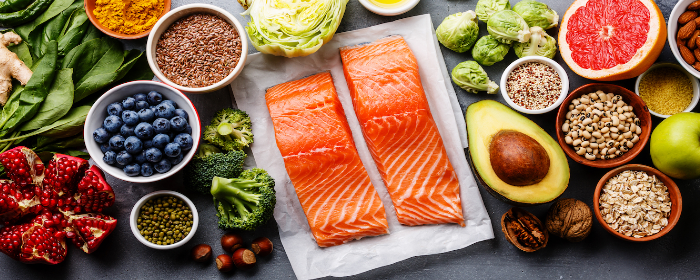
by admin | Apr 20, 2022 | Health Awareness
Fibromyalgia affects up to four million adults in the U.S. alone. Unfortunately, fibromyalgia has no cure, and those who suffer from this chronic condition are only offered treatments that work to reduce symptoms to improve their quality of life.
As researchers continue to study this perplexing condition, they discover new connections between fibromyalgia and the immune system.
What Is Fibromyalgia?
Fibromyalgia is a chronic condition that healthcare providers still struggle to understand. Symptoms of fibromyalgia are similar to many other illnesses and include:
- Muscle and bone pain
- Fatigue
- Sensitivity and tenderness
- Sleep disruptions
- Brain fog
There are no tests to diagnose fibromyalgia definitively, so the condition is often misdiagnosed.
What Causes Fibromyalgia?
While the cause of fibromyalgia is unknown, researchers are getting closer to understanding the condition through its connection to the immune system.
Patients with rheumatoid arthritis and lupus, both autoimmune diseases, are more likely to have fibromyalgia. Autoimmune diseases occur when the body mistakenly unleashes its immune response against the healthy cells of organs and tissues.
Fibromyalgia can occur in conjunction with other autoimmune diseases. Additionally, fibromyalgia symptoms like fatigue and brain fog often overlap with autoimmune disorders.
These factors led researchers to theorize that fibromyalgia may be an autoimmune disorder, even though it doesn’t cause inflammation, a common symptom of autoimmune diseases.
In a recent study, mice injected with auto-antibodies from people with fibromyalgia began to experience fibromyalgia-like symptoms. This new development may lead to new tests to diagnose fibromyalgia and new treatments for those suffering from the condition.
Living with Fibromyalgia
Patients with fibromyalgia suffer from the pain, fatigue, and other symptoms associated with the condition, in addition to common social misconceptions. While fibromyalgia doesn’t have a cure, symptoms are often well-managed through diet and exercise, medications, alternative therapies, and stress relief.
Patients are exploring regenerative medicine, also known as stem cell therapy, to help manage their symptoms experienced with fibromyalgia or an autoimmune condition. Stem cells are the building blocks and, specifically, mesenchymal stem cells have the regenerative properties to differentiate into any cell type while also addressing pain and inflammation within the body.

by admin | Jan 12, 2022 | Health Awareness
Taking care of your immune system may be the most important thing you can do to stay healthy and feel younger. Add these eight superfoods to your diet to help you meet your wellness goals naturally.
1. Garlic
Garlic is a prebiotic that contains allicin, a bioactive shown to increase disease-fighting cells and immune system T cells. One study also found that taking aged garlic extract supplements could help reduce cold and flu symptoms.
2. Mushrooms
Mushrooms are packed with an important soluble fiber known as beta-glucan. Beta-glucan stimulates the immune system and defends against many types of fungal and bacterial infections, parasites, and viruses.
3. Yogurt
Yogurt provides the healthy probiotic bacteria your gut needs to stay healthy. Some research suggests probiotics may even help reduce the length and severity of common cold symptoms.
4. Salmon
You already know the omega-3 fatty acids in salmon are good for your heart, but you may not have realized salmon is also a good source of vitamin D. Vitamin D may help lower your chances of developing an upper respiratory infection.
5. Kiwi
It’s strange, it’s fuzzy, it’s green, and it’s also packed with vitamin C. Kiwi is one of the few non-citrus foods that can deliver big doses of vitamin C, which is vital for maintaining the production of white blood cells and fighting off disease pathogens.
6. Tea
If you need a reason to curl up with a book and a steaming cup of tea, keeping your immune system strong is the perfect excuse. Drink five to six cups of black, green, or herbal tea to boost immune activity. You get bonus antimicrobial points by adding honey to your mug.
7. Beans and Lentils
Eat more beans and lentils if you want to live longer. In the “blue zones” (areas of the world where people live longest), legumes are a staple. Beans and lentils are high in zinc, a mineral that boosts white blood cell production as well as providing microbial protection.
8. Blueberries
Blueberries are rich in flavonoids which contain several immune-boosting properties. The flavonoids specific to blueberries may decrease the incidence and severity of infections in the upper respiratory tract as well as help fight aging naturally.
For more health awareness blogs, please visit www.stemedix.com/blog.

by admin | Aug 8, 2019 | Health Awareness
For quite some time now, scientists and medical experts have known that gut bacteria and the immune system appear to be closely intertwined. Until very recently, however, the precise mechanisms behind this connection have been unclear. In late May, researchers revealed groundbreaking findings observed in animal studies which suggest how the intestines may help regulate our overall health.
The Role of the Lower GI Tract
In mammals, the intestinal system allows healthy nutrients to pass through its walls, while at the same time blocking harmful bacteria from spreading throughout the body. In particular, the lower gastrointestinal (GI) tract is where most of these activities take place: food is processed until it becomes fundamental nutrients, which then pass through the intestinal wall to the bloodstream and to our vital organs. But the question of how the intestinal wall prevents the harmful bacteria from escaping with these nutrients has puzzled researchers.
Now, researchers from Rockefeller University in New York City think they may have an answer. Their study findings show that in mice, a sophisticated intestinal system has been observed. Specifically, certain areas of the GI tract are more likely to elicit an immune system response than others when encountering pathogens. While the intestines look similar, closer inspection reveals a complex intestinal immune system with a unique, organized structure.
Key Differences Throughout the GI System
Interestingly, researchers found that lymph nodes in mice’s large intestines would detect and combat harmful bacteria such as salmonella, whereas small intestines seemed to primarily carry out nutrient absorption and delivery to the bloodstream. According to the researchers, the ability to pinpoint the areas in the intestines which produce the most powerful immune system response could help medical experts create more targeted therapies for GI conditions. They also suspect that the findings could make oral vaccines, which have previously failed to produce an ample immune response, a possibility in the future.
While there is clearly still much to glean from microbiome research, we do know that maintaining healthy gut bacteria can have numerous benefits for our bodies. From eating a diet rich in plant-based food sources to taking supplements as recommended or approved by your doctor, there are many ways you can work towards maintaining a healthy balance of gut flora.




 St. Petersburg, Florida
St. Petersburg, Florida
